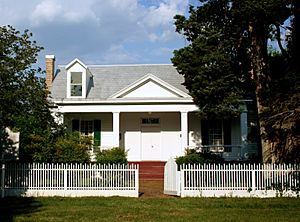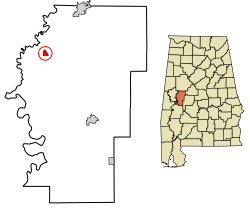Akron, Alabama facts for kids
Quick facts for kids
Akron, Alabama
|
|
|---|---|

Tanglewood in Akron
|
|

Location of Akron in Hale County, Alabama.
|
|
| Country | United States |
| State | Alabama |
| County | Hale |
| Area | |
| • Total | 0.69 sq mi (1.79 km2) |
| • Land | 0.69 sq mi (1.78 km2) |
| • Water | 0.01 sq mi (0.01 km2) |
| Elevation | 131 ft (40 m) |
| Population
(2020)
|
|
| • Total | 225 |
| • Density | 327.99/sq mi (126.68/km2) |
| Time zone | UTC-6 (Central (CST)) |
| • Summer (DST) | UTC-5 (CDT) |
| ZIP code |
35441
|
| Area codes | 205, 659 |
| FIPS code | 01-00676 |
| GNIS feature ID | 112953 |
Akron is a small town located in Hale County, Alabama, in the United States. It was founded on January 18, 1906. On that day, landowners Charles E. Waller, Charles Lightman, and M.H. Murphy sold many lots for businesses and homes.
Akron quickly became the fastest-growing town in Hale County. In just a few years, it had a modern post office, a train station, various shops, a barber shop, a hotel, and factories. The town officially became incorporated in March 1918. According to the 2020 census, Akron had a population of 225 people. One important historical site in Akron is Tanglewood, a beautiful old house listed on the National Register of Historic Places.
Where is Akron?
Akron is in the northwestern part of Hale County. It is about 3 miles (5 km) southeast of the Black Warrior River. The town is also about 1 mile (1.6 km) northwest of Alabama State Route 60.
Greensboro, which is the county seat of Hale County, is about 17 miles (27 km) southeast of Akron. Eutaw is 14 miles (23 km) to the southwest, and Moundville is the same distance to the northeast.
The United States Census Bureau says that Akron covers a total area of about 0.69 square miles (1.79 square kilometers). Most of this area is land, with only a tiny part, about 0.01 square miles (0.01 square kilometers), being water.
People in Akron
| Historical population | |||
|---|---|---|---|
| Census | Pop. | %± | |
| 1920 | 675 | — | |
| 1930 | 793 | 17.5% | |
| 1940 | 504 | −36.4% | |
| 1950 | 684 | 35.7% | |
| 1960 | 604 | −11.7% | |
| 1970 | 535 | −11.4% | |
| 1980 | 604 | 12.9% | |
| 1990 | 468 | −22.5% | |
| 2000 | 521 | 11.3% | |
| 2010 | 356 | −31.7% | |
| 2020 | 225 | −36.8% | |
| U.S. Decennial Census | |||
Akron first appeared in the U.S. Census in 1920 as an official town. The population has changed over the years. In 2000, there were 521 people living in Akron. By 2010, the population had decreased to 356. In the most recent census in 2020, the population was 225.
Who Lives in Akron?
The people living in Akron come from different backgrounds. In 2010, about 86.5% of the people were Black or African American. About 13.2% were White. A small number, 0.3%, reported having two or more races. Also, 0.3% of the population was Hispanic or Latino.
By the 2020 census, the population was 225. Most residents, about 88.44%, were Black or African American. White residents made up about 8.44% of the population. A small number of people were Asian (0.89%) or identified as having two or more races (1.78%). About 0.44% of the population was Hispanic or Latino.
In 2000, there were 207 households in Akron. About 36.7% of these households had children under 18 living there. The average household had about 2.52 people. The average family size was about 3.15 people.
The median age in Akron in 2000 was 32 years old. This means half the people were younger than 32, and half were older. About 29.4% of the population was under 18 years old. About 14.6% of the population was 65 years or older.
Famous Person from Akron
- Riggs Stephenson (1898–1985) was a professional baseball player. He played as a left fielder for the Chicago Cubs in Major League Baseball. His nickname was Old Hoss.
See also
 In Spanish: Akron (Alabama) para niños
In Spanish: Akron (Alabama) para niños
 | Jewel Prestage |
 | Ella Baker |
 | Fannie Lou Hamer |

